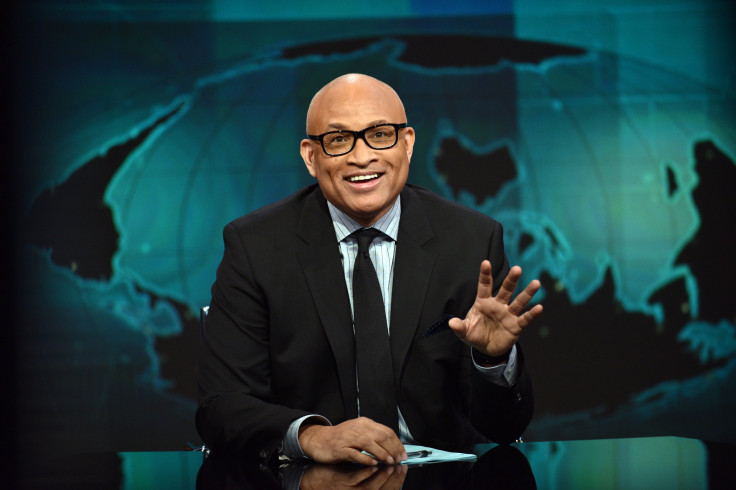Larry Wilmore's 'The Nightly Show' Canceled; The 5 Best Moments From The 'Colbert Report' Heir
For months on Comedy Central's "The Nightly Show," host Larry Wilmore has been satirizing the shenanigans of the 2016 election cycle under the headline "The Unblackening," a reference to the fact that, with no people of color in contention to succeed President Barack Obama, a white person will once again be inhabiting the White House. But Wilmore probably did not figure he would lose his job before Obama.
When Stephen Colbert ditched Comedy Central's "The Colbert Report" to replace David Letterman at CBS' "The Late Show," Wilmore, a veteran of Comedy Central's "Daily Show," stepped into Colbert's time slot to debut "The Night Show." From his first episode in January 2015, Wilmore brought a fresh perspective to the white male dominated late night comedy game, skewering race relations in America in ways no white comedian ever could. However, struggling ratings have led Comedy Central to cancel the series. On Monday, the network announced that this week's episodes will be the last for the show. "@Midnight" will slide up a half hour to take its place for the time being.

No one can dispute the fact that "The Nightly Show" failed to score big ratings — for most of its run it was pulling in around half of the audience it inherited from "The Colbert Report" — but Comedy Central is losing something valuable. In an era where late night TV has largely pivoted to intentionally viral sketches designed for easy sharing on social media — comedians like Jimmy Fallon and James Corden have mastered this — Wilmore instead aimed for unfiltered conversation from underrepresented voices. A central tenet of Wilmore's show was a nightly panel discussion featuring a guest and a few of his writers, largely women and people of color. Those roundtable discussions spanned topics as diverse as the difficulties black women face dating to Bill Cosby's rape allegations, topics must late night shows would only touch with surface monologue jokes, if at all.
Those discussions, along with Wilmore's monologues and sketches, might not have been the most viral-tailored segments on TV, but they did represent a unique and assured voice — who else on late night TV could have mocked Donald Trump's Evangelical appeal by playing the part of a Baptist preacher — something many critics argue his post-Jon Stewart "Daily Show" lead-in is still struggling to find with Trevor Noah. Perhaps, "The Nightly Show" would have fared better on premium cable or streaming — Bill Maher's "Real Time" sports a similar format, but is insulated from some ratings pressures on HBO — but the show's cancelation represents the loss of a beacon of diversity for cable. For better or worse, Wilmore set out to "keep it 100."
The loss of "The Nightly Show" comes after the mixed reaction to Larry Wilmore's hosting job at the 2016 White House Correspondents' Dinner in April. Wilmore's standup routine was overshadowed by the controversy that erupted after Wilmore referred to President Obama as "my n-----."
In honor of Wilmore's departure, here are five highlights from the year and half run of "The Nightly Show."
1. Black Fatherhood
An example of the conversational diversity Wilmore brought to the table, in one of his earliest episodes, he ditched the regular format for an episode-long discussion on black fatherhood in America. Wilmore brought together a panel that included New York Times columnist Charles Blow, rapper Common, Joe Jones of the Center for Urban Families and comedian Mike Yard to discuss the fact that that 72 percent of black children are born to unwed mothers. The discussion was a refreshingly honest take on the hot button issue in a way only a comedy show can deliver.
2. Alton Sterling
Wilmore's run on "The Nightly Show" coincided with the rise of Black Lives Matter in the U.S. While the movement predates the show's debut, it took control of the national conversation in a big way in 2015. That left Wilmore, the only African-American late night host on TV, in a unique position to weigh in on the issue, like he did with this searching take on the Alton Sterling shooting and the All Lives Matter movement in July.
3. The Unblackening
This recent highlight from Wilmore disproves the ignorant notion that the show could only tackle race. After a tumultuous week in the Trump campaign, Wilmore skewered the GOP nominee in one of his trademark "Unblackening" segments. Wilmore's series on the election has been some of the sharpest political commentary of 2016.
4. Jeb!
During an interview with CNN's Jake Tapper, former Florida Gov. Jeb Bush tried to explain how it was fair to blame Hillary Clinton for the Benghazi embassy attack, but not Bush's brother, President George W. Bush, for the 9/11 terror attacks. Bush's response to Tapper's grilling was not his best moment. Wilmore had a field day.
"Why are you shaking your head the entire time you answer this question? It’s almost like your head can’t contain the bull s--- your mouth is spewing," Wilmore joked.
5. Bill O'Reilly
Wilmore knows a thing or two about diversity. As the only African-American late night host in the game, the comedian often used his show to highlight not only his own voice, but those of many other unrepresented demographics in television. Through comedians like Mike Yard, Grace Parra, Franchesca Ramsey, Ricky Velez, Wilmore gave black, female and Latino voices a platform. So, who better to call out Fox News' Bill O'Reilly for moderating a conversation on race featuring all white people.
© Copyright IBTimes 2024. All rights reserved.












